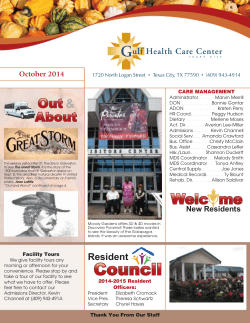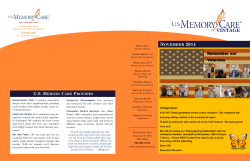
Krista Bower, Louanne Keenan and Susan
YMCA Downtown Housing: A Case Study in Vulnerability & Housing PARTNERS The Project Team Louanne Keenan, PhD; Director of Community Engaged Research, University of Alberta Joan Baker, BSC, MTS, RSW; General Manager of Community and Housing Initiatives, YMCA of Northern Alberta Krista Brower, BA (Hons.), M.Ed Candidate; Program Evaluation Director, YMCA of Northern Alberta Susan Watson, PHEc; Manager Downtown Housing, YMCA of Northern Alberta Research Partners and Contributors Bethany M. MacCallum, BA, BMusEd, MLIS Candidate; University of Alberta Claire Neeland, BA; University of Alberta Katherine Hancock, HBSc, MA; University of Alberta To Our Participants To the staff, community stakeholders and residents of the facility who offered their voice, expecting nothing in return, we honour and thank you. FACILITY Provision of housing beginning in 1908 with a 13 bedroom facility in downtown Edmonton Today, consists of four floors of more than 100 rooms in the heart of downtown Edmonton Can accommodate up to 120 individuals Some residents stay for less than thirty days (16%); others stay for months or years while looking for permanent housing (84%) Many short-term residents stay as a result of a crisis situation Men, women, children from diverse backgrounds Residents are a vulnerable population (e.g., mental health concerns, addiction) PURPOSE OF THE PROJECT To conduct an exploratory study into the facility and residents who live there To define and describe the type of housing model DT Housing is using To understand the role the DT Housing has in the community, and for residents and staff To explore perspectives and experiences of DT Housing stakeholders PROJECT OVERVIEW Phase One Phase Two Phase Three Phase Four KEY FINDINGS LIT REVIEW: HOUSING MODELS Standardized lexicon regarding some of the following housing options has failed to emerge. Chandler (2008) and Lenk (2004) have identified four main housing types: 1. Transitional housing 2. Mixed integrated (or congregate) housing 3. Supported housing 4. Supportive housing The DT housing facility emerged as a unique facility that can be classified as “congregate” housing, although it spans transitional and permanent supportive housing for many residents. STAFF AND RESIDENT KEY THEMES Safe, Affordable and Available Housing Option: Residents and staff reported that the YMCA DT Housing provided residents with a safe, secure, affordable place to stay that was available to them in their time of need. “I didn’t have a place to go at the time, uhm, it was kind of rushed and the YMCA was available…I couldn’t get any work…even…a job that paid like minimum wage, I couldn’t have afforded an apartment even.” - YMCA DT Housing Resident Location of the Facility: Residents and staff noted that the location of the facility was close to resources, supports, transit, and areas residents like to go during their day. “The location here too is great for people who want to get back into the workforce, for people trying to rebuild their lives again. It’s a central location, you can get to anywhere in the city, the transit system, bus system, it’s all good here.”– YMCA DT Housing Resident STAFF AND RESIDENT KEY THEMES Support of Staff: Residents consistently commented about the friendly, supportive staff that work and the importance they hold in the residents’ lives. Residents noted that the staff were a key component In terms of supports “What a resident might consider success, sometimes I might not even recognize the degree or work that we’ve done with them, because … I may not think I’m not doing that much for them by just listening, but to them, it’s huge, because it helps them recognize certain things in life that they could be doing, or are doing that could be helpful..” – YMCA Staff Member COMMUNITY STAKEHOLDER KEY THEMES Appropriate Accommodation: Key components of why the residents stay in the facility include: location, support, affordability, community, and name recognition. Access is provided to critical key resources and supports in the community as a result of location, and the supportive services offered to residents. Facility is affordable and catered to those who might not be able to stay anywhere else. Facility provided a sense of community and sense of comfort to residents. YMCA has a reputation for being accepting, tolerant, kind, for delivering quality service and fulfilling community need. “There is security, programming and its [DT housing facility] a safe place, a warm place to sleep and it is very affordable” – Community Stakeholder COMMUNITY STAKEHOLDER KEY THEMES Uniqueness and Importance: Population served is not unique to the inner city; however, the housing model, building, and spectrum of people who choose to stay there are unique. Limited barriers to access the housing that the YMCA provides High tolerance and the reputation the Y has with residents, clients of their services and the larger community. There is a shortage of transitional and permanent supportive housing and the DT Housing Facility is filling a need in the community that was not necessarily in its original mandate. “The YMCA has a reputation for being tolerant, non-judgmental”’ – Community Stakeholder HOW THE RESEARCH IS CONTRIBUTING TO PREVENTING OR ENDING HOMELESSNESS: LEARNINGS Facility: Unique housing model Congregate housing, spanning transitional and permanent categories Provision of safe, stable and affordable accommodations Reduced barriers of access (no damage deposit, pay daily, weekly) Location of facility Supportive services provided Client-centred and harm-reduction models of housing HOW THE RESEARCH IS CONTRIBUTING TO PREVENTING OR ENDING HOMELESSNESS: LEARNINGS More affordable housing is needed that fits people’s diverse life circumstances A spectrum of housing options is desirable for individuals Flexibility of housing options Sense of community is important Location is critical Anticipated needs for youth Anticipated needs for seniors to ‘age in place’ THANK YOU! Questions? Contact Information: Krista Brower, Evaluation Director, YMCA of Northern Alberta Phone: 780-966-3304 Email: kbrower@edmonton.ymca.ca
© Copyright 2025









